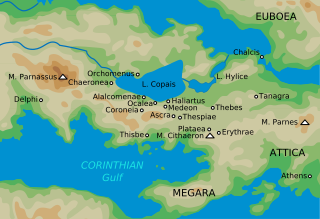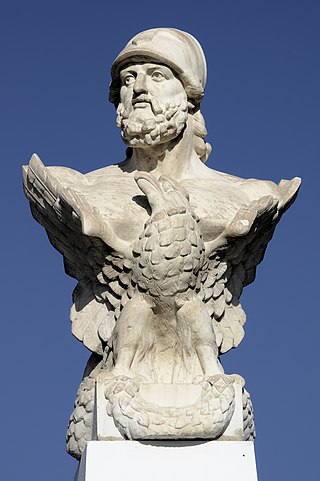Related Research Articles

The Second Peloponnesian War, often called simply the Peloponnesian War, was an ancient Greek war fought between Athens and Sparta and their respective allies for the hegemony of the Greek world. The war remained undecided until the later intervention of the Persian Empire in support of Sparta. Led by Lysander, the Spartan fleet finally defeated Athens which began a period of Spartan hegemony over Greece.

Pericles was a Greek politician and general during the Golden Age of Athens. He was prominent and influential in Ancient Athenian politics, particularly between the Greco-Persian Wars and the Peloponnesian War, and was acclaimed by Thucydides, a contemporary historian, as "the first citizen of Athens". Pericles turned the Delian League into an Athenian empire and led his countrymen during the first two years of the Peloponnesian War. The period during which he led Athens as Archon (ruler), roughly from 461 to 429 BC, is sometimes known as the "Age of Pericles", but the period thus denoted can include times as early as the Persian Wars or as late as the following century.
This article concerns the period 469 BC – 460 BC.
This article concerns the period 449 BC – 440 BC.
This article concerns the period 429 BC – 420 BC.
Cleon was an Athenian general during the Peloponnesian War. He was an early representative of the commercial class in Athenian politics; which during the early Peloponnesian war was coming into prominence – although he was an aristocrat himself. He strongly advocated for an offensive war strategy and is remembered for being ruthless in carrying out his policies. He was often depicted in a negative way, predominantly by Thucydides and the comedic playwright Aristophanes, who both represent him as an unscrupulous, warmongering demagogue. Cleon was the son of Cleaenetus.
The helots were a subjugated population that constituted a majority of the population of Laconia and Messenia – the territories ruled by Sparta. There has been controversy since antiquity as to their exact characteristics, such as whether they constituted an Ancient Greek tribe, a social class, or both. For example, Critias described helots as "slaves to the utmost", whereas according to Pollux, they occupied a status "between free men and slaves". Tied to the land, they primarily worked in agriculture as a majority and economically supported the Spartan citizens.

The Battle of Tanagra was a land battle that took place in Boeotia in 457 BC between Athens and Sparta during the First Peloponnesian War. Tension between Athens and Sparta had built up due the rebuilding of Athens' walls and Spartan rejection of Athenian military assistance. The Athenians were led by Myronides and held a strength of 14,000. The Spartans were led by Nicomedes and had a total of 11,500 soldiers. While both the Athenians and Spartans suffered great losses, Sparta ultimately claimed victory in this battle.
Pleistoanax, also spelled Plistoanax, was Agiad king of Sparta from 458 to 409 BC. He was the leader of the peace party in Sparta at a time of violent confrontations against Athens for the hegemony over Greece.
The Megarian Decree was a set of economic sanctions levied upon Megara c. 432 BC by the Athenian Empire shortly before the outbreak of the Peloponnesian War. This move is considered one of the first uses of economics as a foreign policy tool. The decree addressed the Megarians' supposed trespass on land sacred to Demeter known as the Hiera Orgas, the killing of the Athenian herald who was sent to their city to reproach them, and giving shelter to slaves who had fled from Athens. The Megarian decree effectively blocked Megara from trading in any port within the Delian League, isolating the city and greatly damaging its economy. The exact influence the Megarian Decree had on the beginning of the Peloponnesian War is a matter that is highly debated to this day.

Cimon or Kimon was an Athenian strategos and politician.

Pentecontaetia is the term used to refer to the period in Ancient Greek history between the defeat of the second Persian invasion of Greece at Plataea in 479 BC and the beginning of the Peloponnesian War in 431 BC. The term originated with a scholiast commenting on Thucydides, who used it in their description of the period. The Pentecontaetia was marked by the rise of Athens as the dominant state in the Greek world and by the rise of Athenian democracy, a period also known as Golden Age of Athens. Since Thucydides focused his account on these developments, the term is generally used when discussing developments in and involving Athens.
Lamachus was an Athenian strategos or general in the Peloponnesian War. He commanded as early as 435 BCE, and was prominent by the mid 420s. Aristophanes caricatured him in The Acharnians and subsequently honoured his memory in The Frogs. He was one of the three generals placed in command of the Sicilian Expedition.
Thucydides, son of Melesias was a prominent politician of ancient Athens and the leader for a number of years of the powerful conservative faction. While it is likely he is related to the later historian and general Thucydides, son of Olorus, the details are uncertain; maternal grandfather and grandson fits the available evidence.
Ephialtes was an ancient Athenian politician and an early leader of the democratic movement there. In the late 460s BC, he oversaw reforms that diminished the power of the Areopagus, a traditional bastion of conservatism, and which are considered by many modern historians to mark the beginning of the radical democracy for which Athens would become famous. These powers included the scrutiny and control of office holders, and the judicial functions in state trials. He reduced the property qualifications for holding a public office, and created a new definition of citizenship. Ephialtes, however, would not live to participate in this new form of government for long. In 461 BC, he was assassinated, probably at the instigation of resentful oligarchs, and the political leadership of Athens passed to his deputy, Pericles.
The First Peloponnesian War was fought between Sparta as the leaders of the Peloponnesian League and Sparta's other allies, most notably Thebes, and the Delian League led by Athens with support from Argos. This war consisted of a series of conflicts and minor wars, such as the Second Sacred War. There were several causes for the war including the building of the Athenian long walls, Megara's defection and the envy and concern felt by Sparta at the growth of the Athenian Empire.
The Areopagite constitution is the modern name for a period in ancient Athens described by Aristotle in his Constitution of the Athenians. According to that work, the Athenian political scene was dominated, between the ostracism of Themistocles in the late 470s BC and the reforms of Ephialtes in 462 BC, by the Areopagus, a traditional court composed of former archons. Modern scholars have debated the existence of this phenomenon, with some concluding that Aristotle and his contemporaries invented it to explain Ephialtes' need to limit the Areopagus' powers, and arguing that the lack of concrete measures establishing the Areopagus' dominance shows that the Areopagite constitution is "palpably unhistorical". Other scholars, such as Donald Kagan, have countered that no concrete measures were necessary, as the Areopagus' dominance was established not through actual changes in the laws but through the prestige of its leading members. Aristotle specifically cites the Areopagites' distribution of money to the public as the citizen body prepared to abandon Athens in the face of the advancing Persian army.

The Thasian rebellion was an incident in 465 BC, in which Thasos rebelled against Athenian control, seeking to renounce its membership in the Delian League. The rebellion was prompted by a conflict between Athens and Thasos over control of silver deposits on the Thracian mainland, which Thasos had traditionally mined.
The 464 BC Spartan earthquake occurred along the Sparta fault in the year 464 BC destroying much of what was Sparta and many other city-states in ancient Greece. Historical sources suggest that the death toll may have been as high as 20,000, although modern scholars suggest that this figure is likely an exaggeration. The earthquake gave Spartan helots an opportunity to revolt against their aristocratic rulers, and the Spartan Pericleidas was sent to the Athenians to seek their aid. Their immediate dismissal upon arrival is said to have been a key event that led up to the First Peloponnesian War.
Athenaeus, son of Pericleidas, was a man of ancient Sparta who served during the Peloponnesian War. He was one of the commissioners who, on the part of the Spartans and their allies, ratified the truce for one year which in 423 BCE was made between the Spartans and Athenians and their allies after the Spartans and Athenians agreed to exchange the hostages for the towns captured by the general Brasidas.
References
- ↑ Rahe, Paul A. (2019). Sparta's First Attic War: The Grand Strategy of Classical Sparta, 478-446 B.C. Yale University Press. ISBN 9780300249262 . Retrieved 2024-08-30.
- ↑ Cartledge, Paul (2003). The Spartans: The World of the Warrior-Heroes of Ancient Greece. Abrams. p. 160. ISBN 9781590208373 . Retrieved 2024-08-30.
- ↑ Plutarch, Parallel Lives "Cimon" 16
- ↑ Aristophanes, Lysistrata 1137-44
- ↑ Farenga, Vincent (2006). Citizen and Self in Ancient Greece: Individuals Performing Justice and the Law. Cambridge University Press. p. 407. ISBN 9781139456784 . Retrieved 2024-08-30.
- ↑ Kagan, Donald (1998). Pericles Of Athens And The Birth Of Democracy. Free Press. p. 41. ISBN 9780684863955 . Retrieved 2024-08-30.
- ↑ Kagan, Donald (2013). The Outbreak of the Peloponnesian War. Cornell University Press. pp. 267–268. ISBN 9780801467202 . Retrieved 2024-08-30.
- ↑ Aristophanes (1911). Rogers, Benjamin Bickley (ed.). Lysistrata of Aristophanes. Translated by Rogers, Benjamin Bickley. G. Bell. p. 133. Retrieved 2024-08-30.